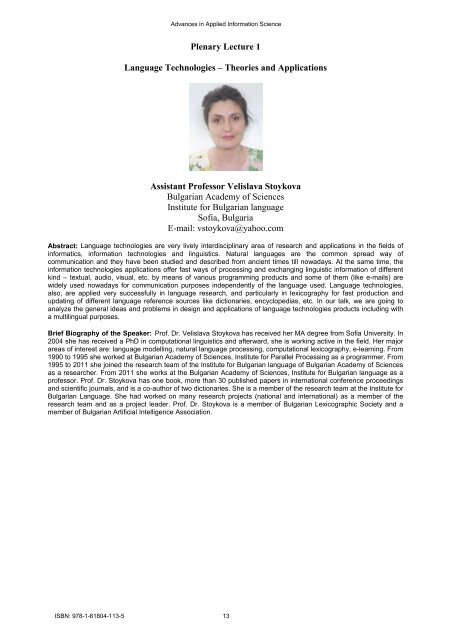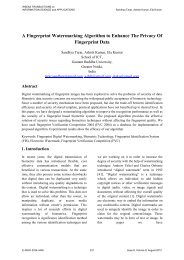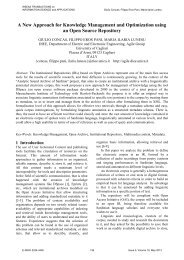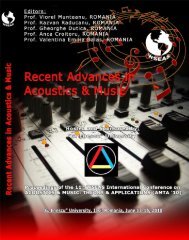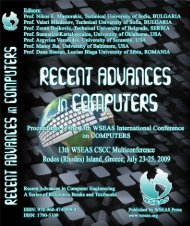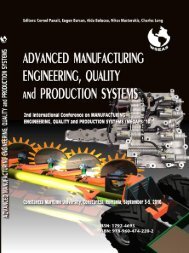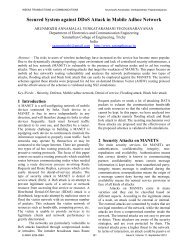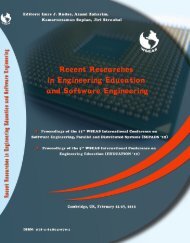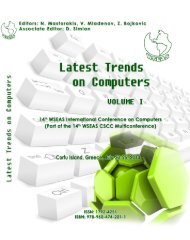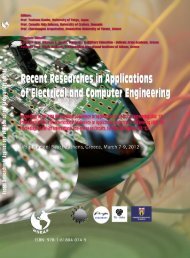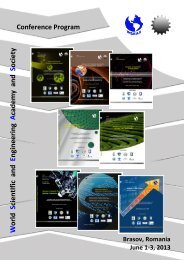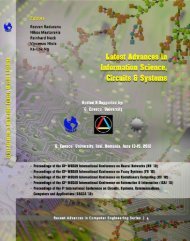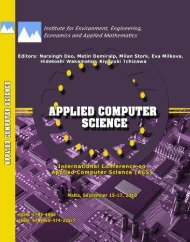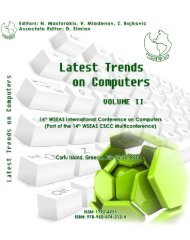ADVANCES in APPLIED INFORMATION SCIENCE - WSEAS
ADVANCES in APPLIED INFORMATION SCIENCE - WSEAS
ADVANCES in APPLIED INFORMATION SCIENCE - WSEAS
Create successful ePaper yourself
Turn your PDF publications into a flip-book with our unique Google optimized e-Paper software.
Advances <strong>in</strong> Applied Information SciencePlenary Lecture 1Language Technologies – Theories and ApplicationsAssistant Professor Velislava StoykovaBulgarian Academy of SciencesInstitute for Bulgarian languageSofia, BulgariaE-mail: vstoykova@yahoo.comAbstract: Language technologies are very lively <strong>in</strong>terdiscipl<strong>in</strong>ary area of research and applications <strong>in</strong> the fields of<strong>in</strong>formatics, <strong>in</strong>formation technologies and l<strong>in</strong>guistics. Natural languages are the common spread way ofcommunication and they have been studied and described from ancient times till nowadays. At the same time, the<strong>in</strong>formation technologies applications offer fast ways of process<strong>in</strong>g and exchang<strong>in</strong>g l<strong>in</strong>guistic <strong>in</strong>formation of differentk<strong>in</strong>d – textual, audio, visual, etc. by means of various programm<strong>in</strong>g products and some of them (like e-mails) arewidely used nowadays for communication purposes <strong>in</strong>dependently of the language used. Language technologies,also, are applied very successfully <strong>in</strong> language research, and particularly <strong>in</strong> lexicography for fast production andupdat<strong>in</strong>g of different language reference sources like dictionaries, encyclopedias, etc. In our talk, we are go<strong>in</strong>g toanalyze the general ideas and problems <strong>in</strong> design and applications of language technologies products <strong>in</strong>clud<strong>in</strong>g witha multil<strong>in</strong>gual purposes.Brief Biography of the Speaker: Prof. Dr. Velislava Stoykova has received her MA degree from Sofia University. In2004 she has received a PhD <strong>in</strong> computational l<strong>in</strong>guistics and afterward, she is work<strong>in</strong>g active <strong>in</strong> the field. Her majorareas of <strong>in</strong>terest are: language modell<strong>in</strong>g, natural language process<strong>in</strong>g, computational lexicography, e-learn<strong>in</strong>g. From1990 to 1995 she worked at Bulgarian Academy of Sciences, Institute for Parallel Process<strong>in</strong>g as a programmer. From1995 to 2011 she jo<strong>in</strong>ed the research team of the Institute for Bulgarian language of Bulgarian Academy of Sciencesas a researcher. From 2011 she works at the Bulgarian Academy of Sciences, Institute for Bulgarian language as aprofessor. Prof. Dr. Stoykova has one book, more than 30 published papers <strong>in</strong> <strong>in</strong>ternational conference proceed<strong>in</strong>gsand scientific journals, and is a co-author of two dictionaries. She is a member of the research team at the Institute forBulgarian Language. She had worked on many research projects (national and <strong>in</strong>ternational) as a member of theresearch team and as a project leader. Prof. Dr. Stoykova is a member of Bulgarian Lexicographic Society and amember of Bulgarian Artificial Intelligence Association.ISBN: 978-1-61804-113-5 13


